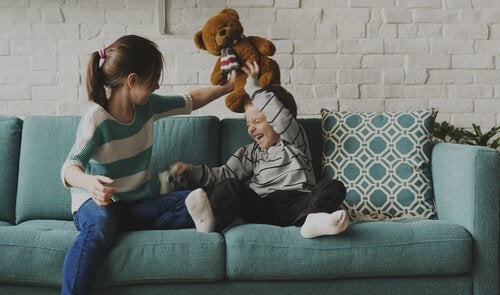Changes in family dynamics are significant; schedules, meals and leisure. And what about changing parents’ focus, distributing tasks and responsibilities?Those who are older brothers know what I’m talking about. It is important to face this from the perspective of an eight – or ten years.
Children begin to realize that they may feel more than one emotion at a time in this space between the age of eight and ten, they may feel angry because someone has taken their place, but at the same time they can feel joy, because the event itself can bring positive elements.
- Adults must respect emotional ambivalence.
- The secret is for the child to explain these contradictory feelings and know that parents understand it.
For parents it seems that the new goal is to create the new family member, however, another challenge is to readjust the expectations and responsibilities of the proponent, if this is not done well, either out of excess or for lack, it is a balance difficulty that often removes and hinders the life of the older brother.
The feeling of not being an only child can lead to two different paths (indifference or hyperresponsibility), but the consequences are also harmful.
“What strange creatures are the brothers? Jane Austen?
Thus, for example, the older brother may be too demanded in the care of younger siblings and even play the role of father or mother in their absence, or even in the presence of their parents, which can become a great pressure and a way to limit the right of younger siblings to make mistakes.
Older siblings must adapt to this new role and perform age-appropriate tasks. The challenge and goal of parents is to be fair. Ideally, parents should empower their eldest child to play their part, not another.
“How the eldest reacts” is what people often ask. There is nervousness, jealousy, envy, anger, etc. The routine and custom thus sought to structure and influence the emotional and academic development of children take a sharp turn to rebuild again. And not only that, there are also new parts to consider.
“Growing up, my siblings acted like they weren’t worried, but I always knew they were paying attention and they were still there. Catherine Pulsifer?
This whole part of formal responsibility also hides positive emotions (pleasure, satisfaction and euphoria). There’s nothing like being complicit and finding that bond where words are sometimes left behind. Sharing secrets, releasing tensions, or finding a way to disconnect is part of what it means to have a little brother.
Sowing the seed of trust and affection is very important, so the fraternal feeling, which goes beyond genetics, will be born, it is possible that the type of relationship changes over the years.
The age differences place both in completely different stages of development, the important thing is that gradually the asymmetry generated by the age difference will fade, giving the possibility of being, in addition to brothers, friends. trust each other.
“Outside, we’ve grown up. But it’s not the same for brothers and sisters. We’ve always met. We know our hearts, we share our personal jokes. We remember our secrets, sufferings and joys. We live outside the effect of time. ? Clara Ortega-

